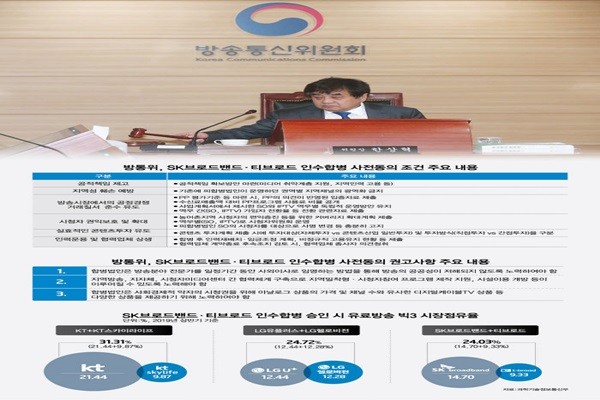M&A between SK Broadband and t-broad received a prior consent from Korea Communications Commission (KCC). KCC has conditionally approved the merger under the premise that they will meet KCC’s approval criteria such as public accountability and better locality.
South Korea’s first merger between a mobile telecommunications company and a cable TV company is about to be completed. Through the merger, SK Broadband’s market shares within South Korea’s multichannel TV broadcasting market will be within 0.7% of the market shares of LG Uplus and LG Hellovision that are currently ranked second in the market. It is expected that KT, LG, and SK will look to fight for hegemony of the market.
◊SK Broadband receives an approval for the merger without difficulty
KCC’s evaluation had focused on the public interest before deciding to approve the merger conditionally. Considering the fact that the merger will be South Korea’s first merger between a telecommunications company and a cable TV company, SK Broadband and t-broad need to maintain their own individual businesses even after the merger and improve rights and interests of viewers and preserve locality.
KCC gave 749.67 points out of 1,000 points on the merger and it has imposed 14 conditions and 3 recommendations. Considering the fact that SK Broadband and t-broad needed to receive at least 650 points, the merger was able to pass without difficulty.
KCC has imposed plans for securing public accountability and fair trades as approval criteria.
KCC and interested parties believe that their ways of protecting viewers are relatively at a reasonable level.
KCC’s recommendations such as appointment of experts in broadcasting as nonexecutive directors and maintenance of channels and prices similar to analog days also do not have any decisive issue.
It has ordered SK Broadband not to broaden t-broad’s local channels in limited areas after the merger and it has also ordered SK Broadband and t-broad to maintain their methods of operating cable TV services and IPTV services separately. These are the only conditions that will have a direct impact on South Korea’s commodity market. They will preserve locality and make the most of intentions of local channels and prepare minimal safety measures so that they will not be any sudden tipping due to IPTV.
“Our emphasis was on maximizing synergy from the merger while minimizing any side effect.” said Heo Wook who is a standing member of KCC. “Our judges want the merger to revive lost vitality of the cable TV market through new investments and diversified contents and do not impede viewers’ rights and interests at the same time.”

◊Merger creates a three-horse race within the multichannel TV broadcasting market
The merger is a merger between a second best IPTV company and a second best cable TV company. Market shares of SK Broadband and t-broad will be responsible for 24.03% (14.70+9.33%) of the market and they will come within 1% of the market shares of LG Uplus and LG Hellovision (24.72%). Considering the fact that the market shares of KT and KT SkyLife are responsible for 31.31%, difference in market shares between SK, LG, and KT is only within 7%.
Due to the merger, there is now a groundwork for them to carry out competitions on an equal footing. It is expected that they will carry out a neck-and-neck race by having the media market as their new battleground.
They are expected to immediately have fierce competitions within the OTT (Over The Top) market. SK Broadband and t-broad has prepared a groundwork to expand subscribers of an OTT platform called “Wavve” that is an alliance between national television networks and contents. KT is planning to reorganize its current OTT service as “Seezn” and accelerate the process of targeting the OTT market.
LG Uplus is competing against KT and SK by strengthening its own VR and AR contents as well as Netflix contents. It is expected that these three telecommunications companies will compete against one another with their contents for a while as better contents will lead to expansion of their platforms.
As regulatory agencies such as KCC have given active investments in contents as one of approval criteria, telecommunications companies must answer the call with investments that are certain.
It is expected that the three telecommunications companies will continue to compete against one another in order to grab a lead of the media platform market.
◊Tasks
Possibility of new controversies about unfair trades as the telecommunications companies compete against one another cannot be excluded. Continuous monitoring is a must so that there is not any unfair act and that consumers are unaffected by a possible unfair act.
As it is expected that there will be similar mergers as the merger between SK Broadband and t-broad as reorganization of the multichannel TV broadcasting market becomes accelerated, it is necessary to modify relevant systems in order to strengthen fairness and effectiveness.
“Although the acquisition process by LG Uplus on CJ Hellovision is basically a same issue as the merger between SK Broadband and t-broad, LG Uplus did not have to wait for a prior consent according to the law.” said Pyo Cheol-soo who is a standing member of KCC. “Because it is logical to apply same conditions on same cases, it is necessary to examine how conditions are levied on similar cases.”
There also needs to be a plan to improve the speed and effectiveness of screening process of M&A goes through Fair Trade Commission, Ministry of Science and ICT, and KCC.
“When there is a request for a prior consent on a merger between two different platforms, we are going to carry out a fast and fair screening process in order to develop our broadcasting industry.” said KCC. “We are going to do our best in order to guarantee public accountability and publicness of broadcasting and to protect viewing rights of the people.”
Staff Reporter Park, Jisung | jisung@etnews.com